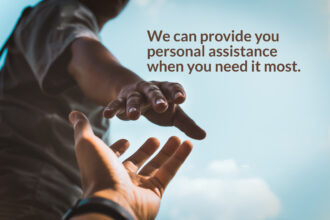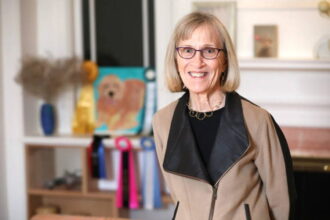From book bans to ‘Don’t Say Gay’ bill, LGBTQ kids feel ‘erased’ in the classroom
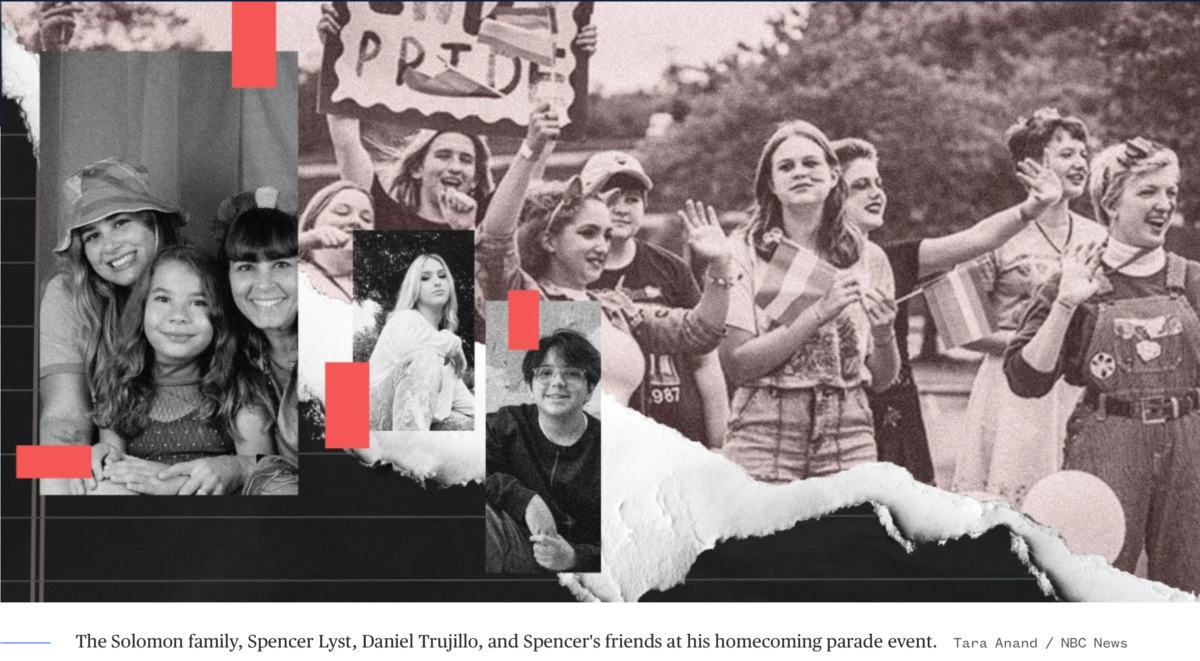
By Matt Lavietes Updated Feb. 20, 2022, updated March 3, 2020 for NBC News
Facing limiting legislation, book bans, harassment and more, gay, and transgender youth say they are being “erased” from the U.S. education system.
Students have repeatedly vandalized Pride posters at Spencer Lyst’s high school in Williamson County, Tennessee. Teachers have skipped over LGBTQ issues in class textbooks. Trans kids in his state have been legally barred from competing on school sports teams that align with their gender identity. Parents have called on school officials to remove books about sexual orientation and gender identity from the county’s elementary curriculum. And while leading his school’s Pride club at a September homecoming parade, Lyst and other LGBTQ students were booed by a group of parents.
“I’m so used to it, but it shouldn’t be something I have to think about,” Lyst, 16, said of the near-constant feeling of being attacked at school because of his identity.
He even said it’s “difficult” to walk into the school bathroom for fear of what or who “might be in there.”
“Like, can I go to the bathroom or am I going to get hate for just existing?” he said.
Lyst’s school experience is a far cry from an isolated case.
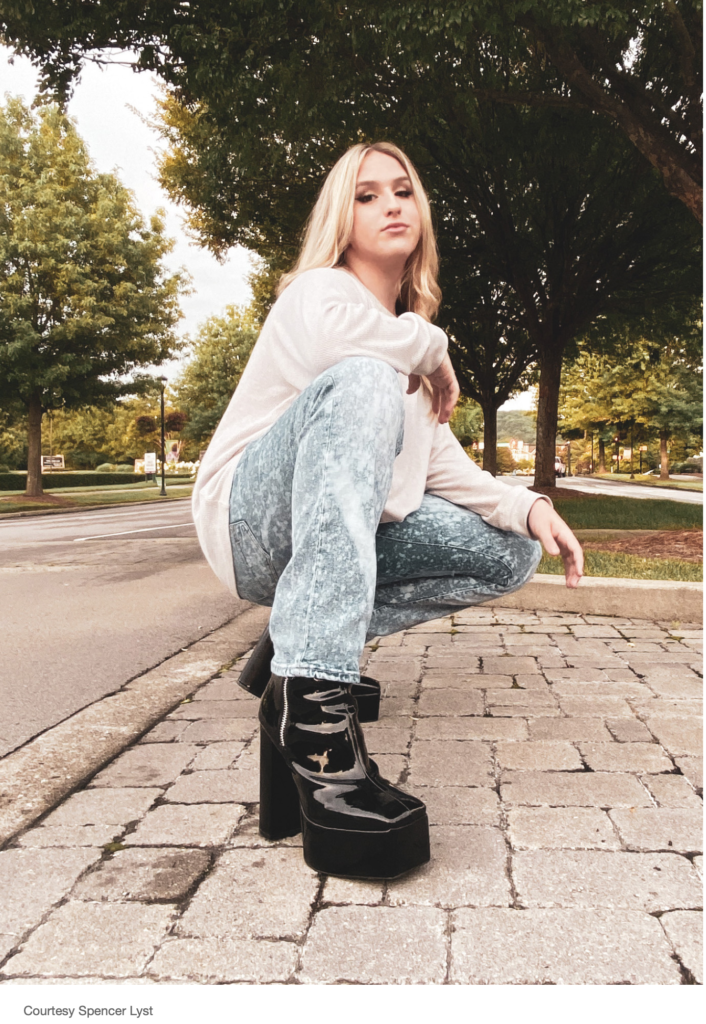
Since the start of the school year, school officials in states across the country have banned books about gay and trans experiences, removed LGBTQ-affirming posters and flags and disbanded gay-straight alliance clubs. In school districts throughout the nation, students have attacked their queer classmates, while state lawmakers have filed hundreds of anti-LGBTQ bills with many seeking to redefine lesbian, gay, bisexual, transgender, and queer students’ places in U.S. schools.
“There is no separating any of these things,” Mary Emily O’Hara, the rapid response manager at LGBTQ advocacy group GLAAD, said at a media briefing on Monday. “What we’re seeing here is anti-LGBTQ groups, on a national level, making schools the new battleground across the board, across various kinds of school policies and various forms of legislation. Schools are the target right now for the anti-LGBTQ movement.” In the majority of cases, conservative school officials, lawmakers and parents say LGBTQ issues do not belong in school because they are “political” and “not age-appropriate” for students.
Conversely, queer youth and their families, along with LGBTQ and ally teachers, say they feel they are being “erased” from the U.S. education system.
‘I’m not going back in the closet’
South Florida mom Jennifer Solomon, 50, has four children. Her eldest child, Nicolette, 28, is a lesbian who teaches fourth grade in Miami-Dade County. Her youngest, Cooper, 11, identifies as male, but Solomon said his “expression is female.” Cooper “never wanted to be a girl,” his mom explained, but he prefers to wear his school’s girls uniform and enjoys dressing up like a fairy-tale princess for fun.
“An easy way to describe it is that he’s the opposite of a tomboy,” she told NBC News.
Despite how hard she works to protect her children, Solomon — who leads her local chapter of PFLAG, an LGBTQ family advocacy group — said the slew of anti-LGBTQ school policies “keeps me up at night.”
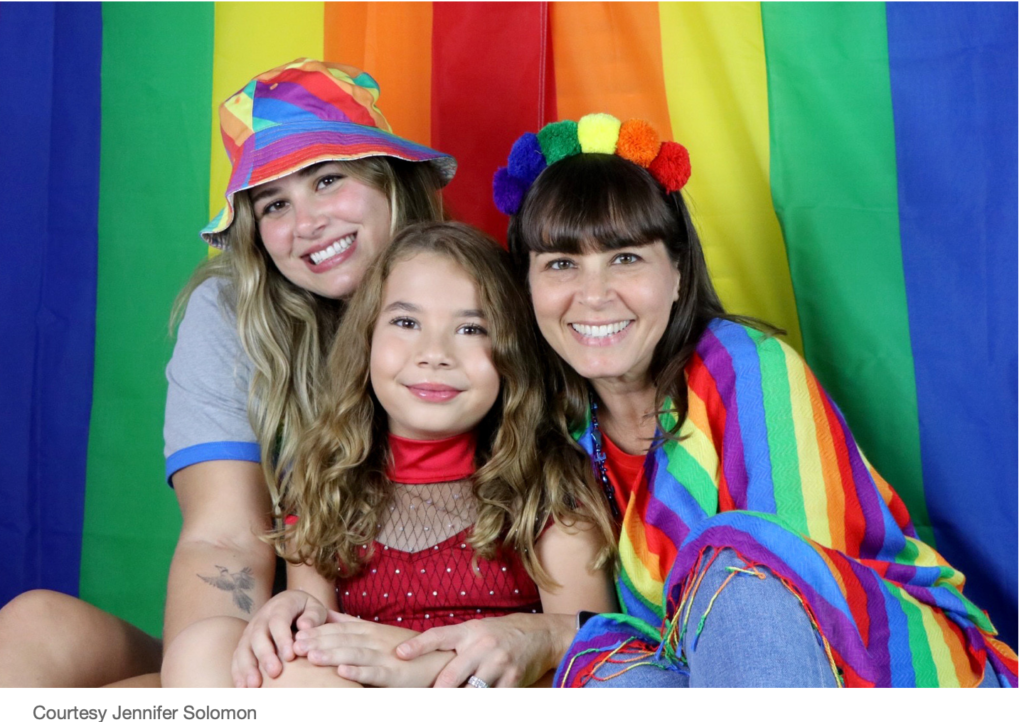
On Monday, Solomon’s governor, Republican Ron DeSantis, signaled that he would support a new piece of state legislation — titled the Parental Rights in Education bill, but dubbed the “Don’t Say Gay” bill — that would prohibit the discussion of sexuality and gender identity in schools.
Speaking at a news event in Miami, DeSantis said it is “entirely inappropriate” for teachers to be having conversations with students about gender identity, citing alleged instances of them telling children, “Don’t worry, don’t pick your gender yet,” and “hiding” classroom lessons from parents.
“Parental rights? Whose parental rights? Only parental rights if you’re raising a child according to DeSantis?” Solomon, who is a nurse manager at a health care company, said of DeSantis’ concerns. “DeSantis tries to paint this picture that every family is this 1950s mom and dad with two kids and a cat and dog. That is not what Florida looks like; that is not what the country looks like.”
“DeSantis has found a weak spot, and that weak spot is children,” she added, suggesting that DeSantis is supporting the measure for political gain. Nicolette Solomon said she is already hesitant to mention her wife — and by default her sexuality — at school, but she said passage of the “Don’t Say Gay” bill would be “the straw that breaks the camel’s back” and vowed to quit if it becomes law.
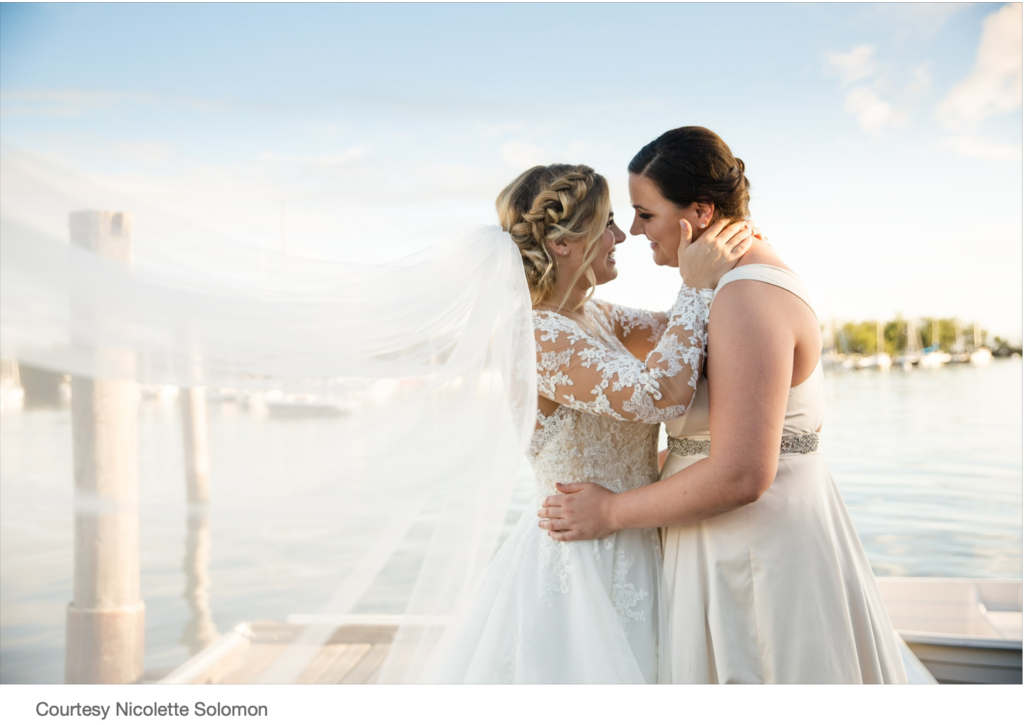
“If I can’t be myself, seven hours a day, five days a week, then I’m going back in the closet, and I can’t do that. It’s not good for my own mental health,” she said. “And I don’t think I can bear to see the students struggle and want to ask me about these things and then have to deny them that knowledge. That’s not who I am as a teacher.”
In less than two months since the start of the year, conservative state lawmakers have filed more than 170 anti-LGBTQ bills — already surpassing last year’s 139 total — with at least 69 of them centered on school policies, according to Freedom for All Americans. The nonprofit group, which advocates for LGBTQ nondiscrimination protections nationwide, said in an email that it didn’t track LGBTQ school policy bills last year, as it was not as much of a “sweeping trend” as it is now.
Three states — including Lyst’s home state of Tennessee — passed bills last year that allow parents to opt students out of any lessons or coursework that mention sexual orientation or gender identity, according to GLSEN, an advocacy group that aims to end LGBTQ discrimination in education. In addition to the “Don’t Say Gay” bill advancing in Florida, there are 15 bills under consideration in eight states that would silence speech about LGBTQ identities in classrooms, according to free speech nonprofit organization PEN America.
But perhaps the biggest trend in state bills targeting LGBTQ youths are those focused on transgender students. Last year, legislators in at least 30 states weighed legislation that would bar trans students from competing on school sports teams that align with their gender identity, according to LGBTQ advocacy group Human Rights Campaign. Nine of those states enacted the bills into law. So far this year, 27 states have proposed similar bills, with South Dakota enacting its version of the legislation into law this month.
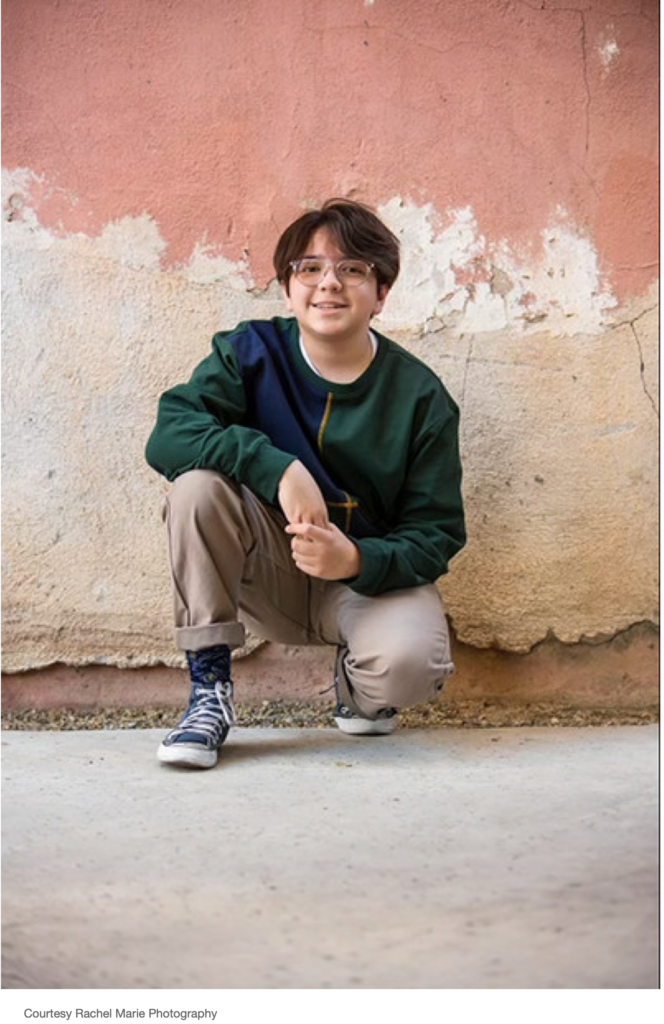
Impact of affirmation
Advocates have long been warning educators about the mental health risks plaguing LGBTQ youths and how anti-LGBTQ policies can exacerbate them.
A survey last year by The Trevor Project, an LGBTQ youth suicide prevention and crisis intervention organization, found that 42 percent of the nearly 35,000 LGBTQ youths who were surveyed — and over half of trans and nonbinary youths — seriously considered suicide within the prior year. Separately, two-thirds of LGBTQ youths said debates about anti-trans legislation have impacted their mental health negatively, according to a small survey The Trevor Project conducted in the fall.
However, researchers at The Trevor Project have also found that LGBTQ youths who reported having at least one LGBTQ-affirming space — such as a school, home or workplace — were significantly less likely to attempt suicide.
With that in mind, Lizette Trujillo drives three hours a day back and forth to her 14-year-old transgender son’s school in Tucson, Arizona. From the time when he socially transitioned in 2015, Daniel’s school was open to the idea of letting him use the bathroom that corresponded with his gender identity — which Trujillo said was not a given in Arizona — and already had experience teaching trans youth.
Students ‘fighting for their basic rights’
There are several examples across the U.S. of students getting proactive and successfully turning around anti-LGBTQ policies.
Aaryan Rawal, 17, was one of more than 400 students in Fairfax County, Virginia, who successfully urged their school officials to reinstate two LGBTQ books in November. Rawal, who is gay, said he was relieved when school board members heeded students’ demands, but he lamented that the organizing efforts forced him to miss class and lose sleep.
“No student in any county in this country wants to go to school fighting for their basic rights,” Rawal said. “Instead of doing statistics homework or hanging out with friends, we were expected to go to school board meetings and lobby school board members for stuff that really shouldn’t be up for debate.”
Last month, a group of students in Palm Beach, Florida, met with their newly hired superintendent to describe their experience being LGBTQ in their county’s schools. They went around, one by one, and relayed stories of harassment and assault from students and bullying from teachers, according to two students who attended the meeting.
“Students have just gotten a collective consciousness that, ‘School sucks and because I’m LGBT this is to be expected,’ and that’s not normal,” Marcel Whyne, a nonbinary high school student who attended the meeting, said. “That shouldn’t be the level of standard that we have for LGBT kids. You’re entitled to be treated like your peers and go to school and, you know, just be bored at school like a normal student, not terrified that you’re going to be harassed and have photos taken of you and be embarrassed and assaulted just because you’re trying to be who you are.”
As for Spencer Lyst, in Tennessee, he set out to start his high school’s Pride club, Indy Pride, last fall with the goal of spreading awareness about the school’s LGBTQ community and providing “a place for people who may feel like they don’t have one.” While being booed by adults at his school’s homecoming was a “difficult” experience, he said he remains undeterred.
“People should know that no matter what bill they try to pass or book they try to ban or thing they try to ban teachers or students from talking about in schools, it doesn’t change who people are, and it doesn’t change who we’re going to continue to be,” Lyst said. “So, trying to take a legal route to ‘protect your kids’ doesn’t work. They are who they are, and if you can’t accept that, maybe it’s you who has some work to do.”
